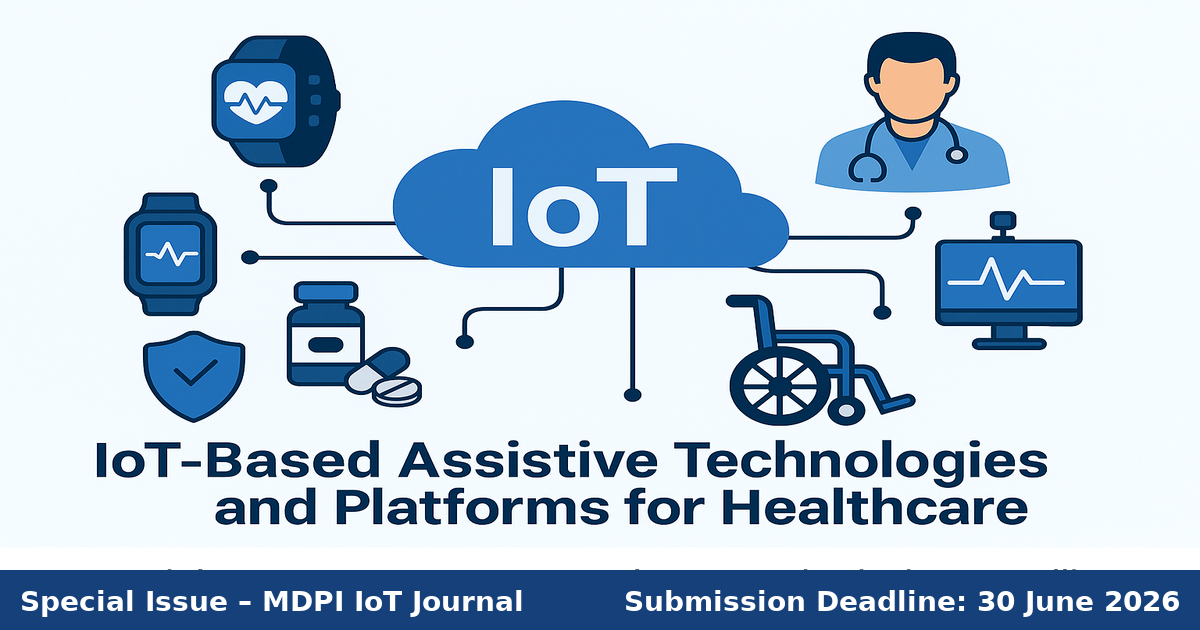- 2.8Impact Factor
- 8.7CiteScore
- 26 daysTime to First Decision
IoT-Based Assistive Technologies and Platforms for Healthcare
Special Issue Information
Dear Colleagues,
The rapid development of Internet of Things (IoT) technologies is transforming healthcare by enabling smart, connected, and adaptive assistive systems. Recent advances in wearable devices, remote monitoring platforms, AI-driven analytics, and cloud-integrated medical services are improving patient care, supporting independent living, and enhancing rehabilitation outcomes. However, the growing complexity of IoT-based healthcare ecosystems introduces new challenges in interoperability, scalability, real-time data processing, and the protection of sensitive medical information.
This Special Issue, "IoT-Based Assistive Technologies and Platforms for Healthcare", invites original research articles, technical notes, and comprehensive reviews on innovative IoT-enabled solutions for assistive healthcare. Topics of interest include, but are not limited to, the following: design and implementation of smart healthcare systems, AI/ML-driven personalized care, privacy-preserving and secure IoT data sharing, blockchain-based healthcare platforms, integration of large language models for clinical decision support, and real-world deployments of connected assistive devices.
By combining multidisciplinary expertise from computer science, biomedical engineering, and cybersecurity, this Special Issue aims to highlight future trends and address open research challenges in building secure, reliable, and intelligent IoT healthcare platforms.
Dr. Mahmoud Abouyoussef
Dr. Mohamed Ibrahem
Guest Editors
Manuscript Submission Information
Manuscripts should be submitted online at www.mdpi.com by registering and logging in to this website. Once you are registered, click here to go to the submission form. Manuscripts can be submitted until the deadline. All submissions that pass pre-check are peer-reviewed. Accepted papers will be published continuously in the journal (as soon as accepted) and will be listed together on the special issue website. Research articles, review articles as well as short communications are invited. For planned papers, a title and short abstract (about 250 words) can be sent to the Editorial Office for assessment.
Submitted manuscripts should not have been published previously, nor be under consideration for publication elsewhere (except conference proceedings papers). All manuscripts are thoroughly refereed through a single-blind peer-review process. A guide for authors and other relevant information for submission of manuscripts is available on the Instructions for Authors page. IoT is an international peer-reviewed open access quarterly journal published by MDPI.
Please visit the Instructions for Authors page before submitting a manuscript. The Article Processing Charge (APC) for publication in this open access journal is 1400 CHF (Swiss Francs). Submitted papers should be well formatted and use good English. Authors may use MDPI's English editing service prior to publication or during author revisions.
Keywords
- IoT in healthcare
- connected health platforms
- wearable devices
- remote monitoring
- privacy
- security
- AI in IoT healthcare

Benefits of Publishing in a Special Issue
- Ease of navigation: Grouping papers by topic helps scholars navigate broad scope journals more efficiently.
- Greater discoverability: Special Issues support the reach and impact of scientific research. Articles in Special Issues are more discoverable and cited more frequently.
- Expansion of research network: Special Issues facilitate connections among authors, fostering scientific collaborations.
- External promotion: Articles in Special Issues are often promoted through the journal's social media, increasing their visibility.
- e-Book format: Special Issues with more than 10 articles can be published as dedicated e-books, ensuring wide and rapid dissemination.

